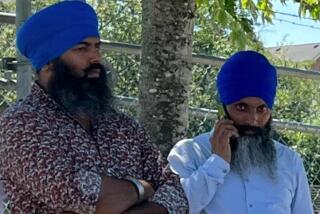Sikh temple shooting anniversary marked by gun-control advocates
It was a shooting that in many ways received less publicity than others that took place last year in Aurora, Colo., and Newton, Conn. But for the Wisconsin community that lived through the rampage at a Sikh temple in Oak Creek, it is a tragedy that will never be forgotten.
Just a year ago on Monday, a lone gunman, Wade Michael Page, 40, a U.S. Army veteran with links to racist groups, opened fire on those at the temple, killing six and injuring four others before he killed himself after being wounded by a responding officer. The shooting was condemned as a hate crime by officials in the United States and in India.
The massacre came less than a month after a lone gunman, James E. Holmes, attacked a movie theater in Aurora, Colo., killing 12 and wounding 70. And just months later, in December, yet another lone gunman attacked the Sandy Hook Elementary School in Newtown, Conn., where 20 students and six adults were killed. Adam Lanza began his shooting spree by killing his mother and ended it by shooting himself to death. Holmes is awaiting trial.
The trio of massacres led to calls for greater gun control across the nation. Some states, including New York and Connecticut, toughened gun and ammunition access. But despite calls by the Obama administration, federal efforts have been largely stymied.
On the anniversary of the Wisconsin shootings, gun-control advocates on Monday renewed their calls for tougher laws.
“We cannot tolerate hate crimes, and as a nation we must dedicate ourselves to preventing incidents of gun violence,” said Dan Gross, president of the Brady Campaign to Prevent Gun Violence, a gun control group. “We were heartbroken when we learned of the shooting at the Sikh temple. The victims were peaceably gathering in a sacred place and were senselessly gunned down. Our thoughts were with the families of the victims, as they are again today.”
Colin Goddard, a survivor of the 2007 Virginia Tech shooting and now an official with the Brady Campaign, was among those attending a vigil and healing ceremony in Oak Creek.
“On this day, we should pause to remember the loved ones lost. It is not easy to carry on after a shooting. I know this all too well. But there are ways to heal, and the path I’ve chosen is through advocacy,” Goddard said. “The vow I can make to the families in Milwaukee today is, I will never stop fighting for better gun laws, so other families will be spared the pain they are now enduring.”
The vigils and remembrances began last week.
The federal government gave a $512,000 grant to fund trauma and mental health services for the Sikh community in southern Wisconsin, according to Atty. Gen. Eric Holder Jr. The federal government also broadened its measurement of hate crimes, adding offenses committed against Sikhs as well as Hindus, Arabs, Buddhists, Mormons, Jehovah’s Witnesses and Orthodox Christians.
“I’m confident that this change will help us better understand the law enforcement challenges we face. It will empower us to better enforce relevant laws to protect everyone in this country. And it is emblematic of our unwavering resolve to prevent and seek justice for acts of hate and terror,” Holder stated.
Those killed on Aug. 5, 2012, were Satwant Singh Kaleka, 65, the president of the congregation; Sita Singh, 41; Ranjit Singh, 49; Prakash Singh, 39; Paramjit Kaur, 41; and Suveg Singh, 84.
On Monday, families of the victims will be joined by gun control advocates, including Mayors Against Illegal Guns, as well as the mayors of Oak Creek and Milwaukee.
On Sunday, hundreds of people, including Wisconsin Gov. Scott Walker, packed the Oak Creek temple for a service remembering the victims of the temple massacre, the Journal Sentinel of Milwaukee reported.
ALSO:
Fort Hood trial set to start amid high security
House members want California egg measure out of farm bill
Whitey Bulger is among the most vicious criminals, prosecutor says
Follow L.A. Times National on Twitter
More to Read
Sign up for Essential California
The most important California stories and recommendations in your inbox every morning.
You may occasionally receive promotional content from the Los Angeles Times.











